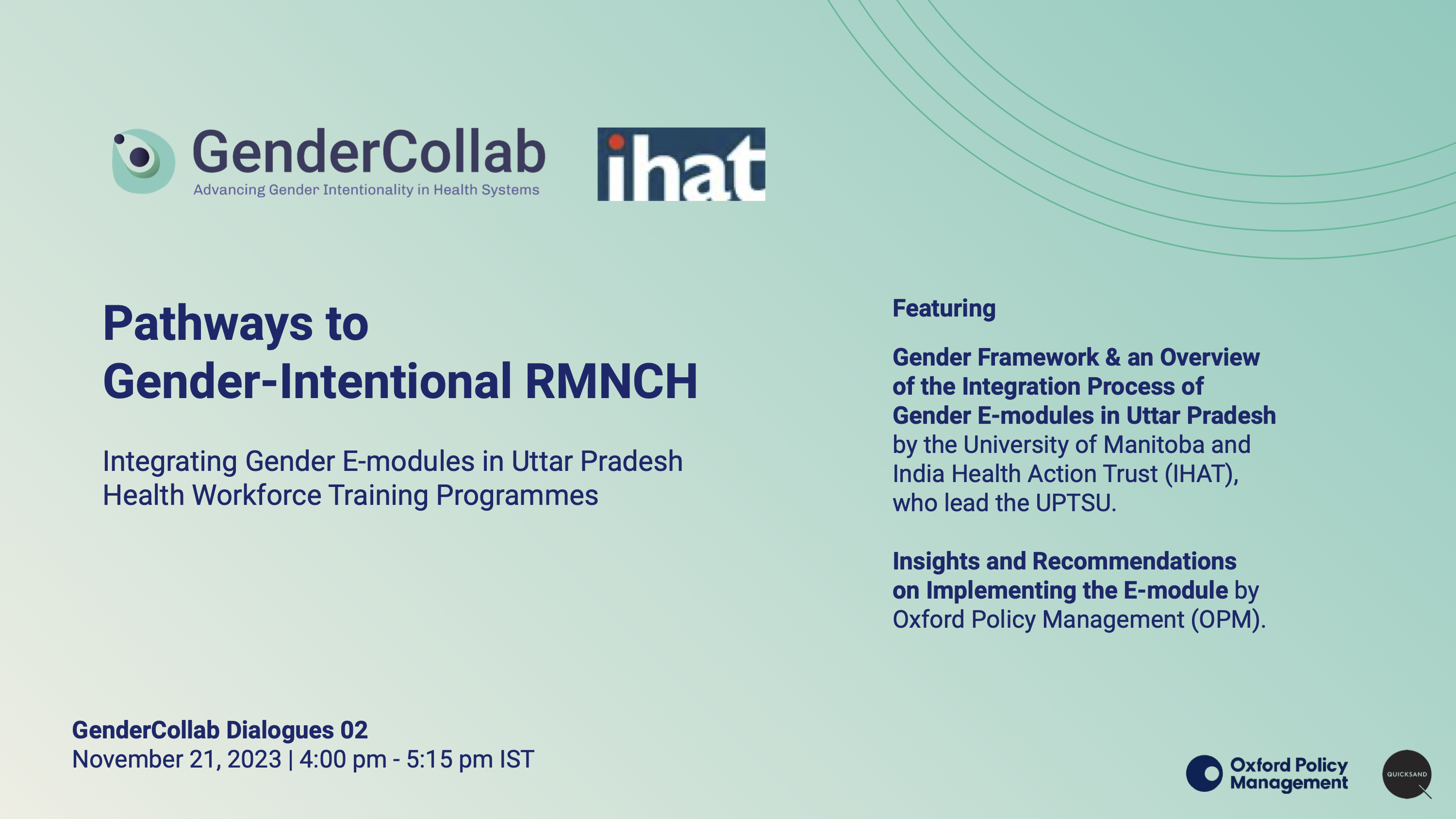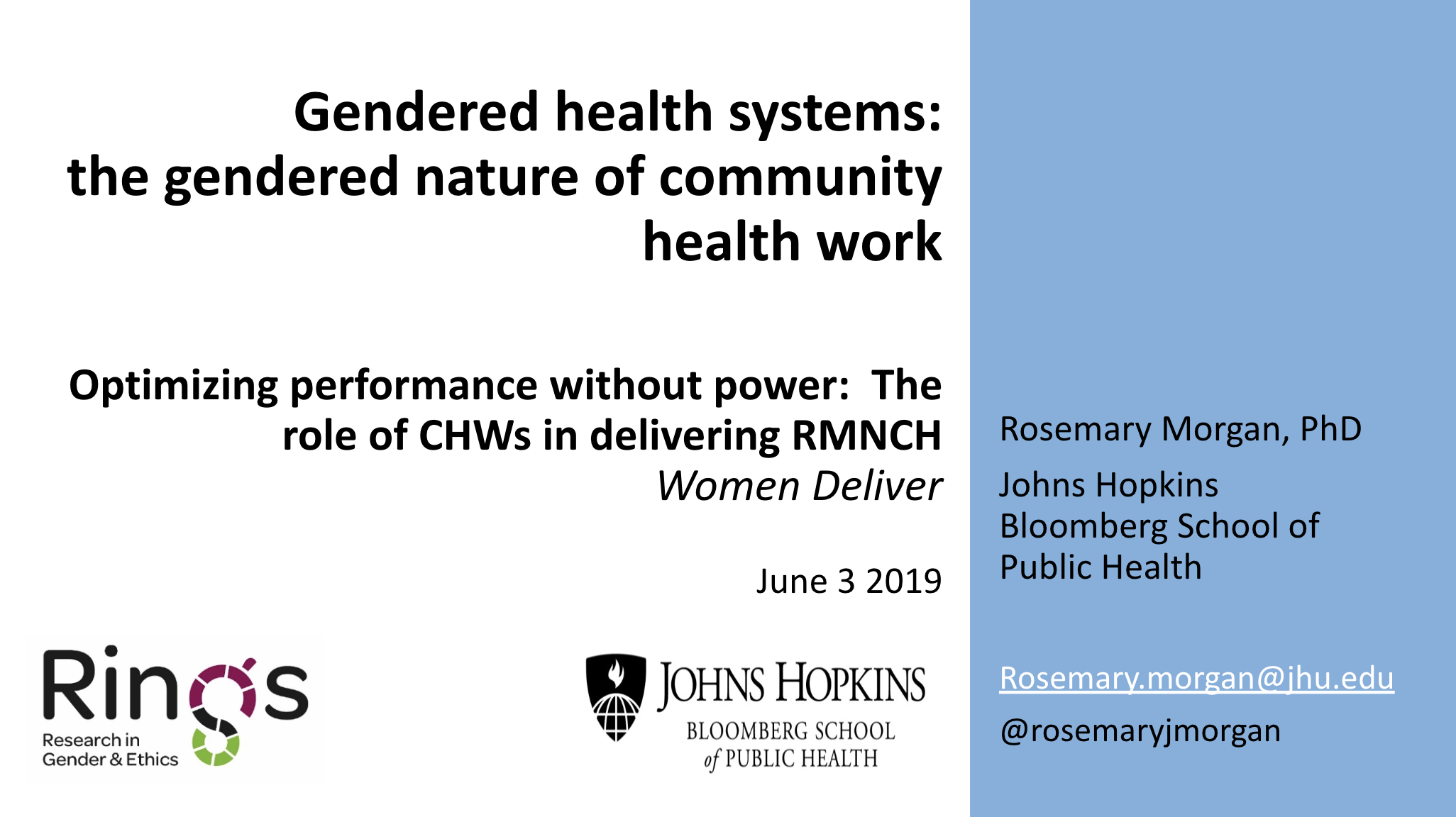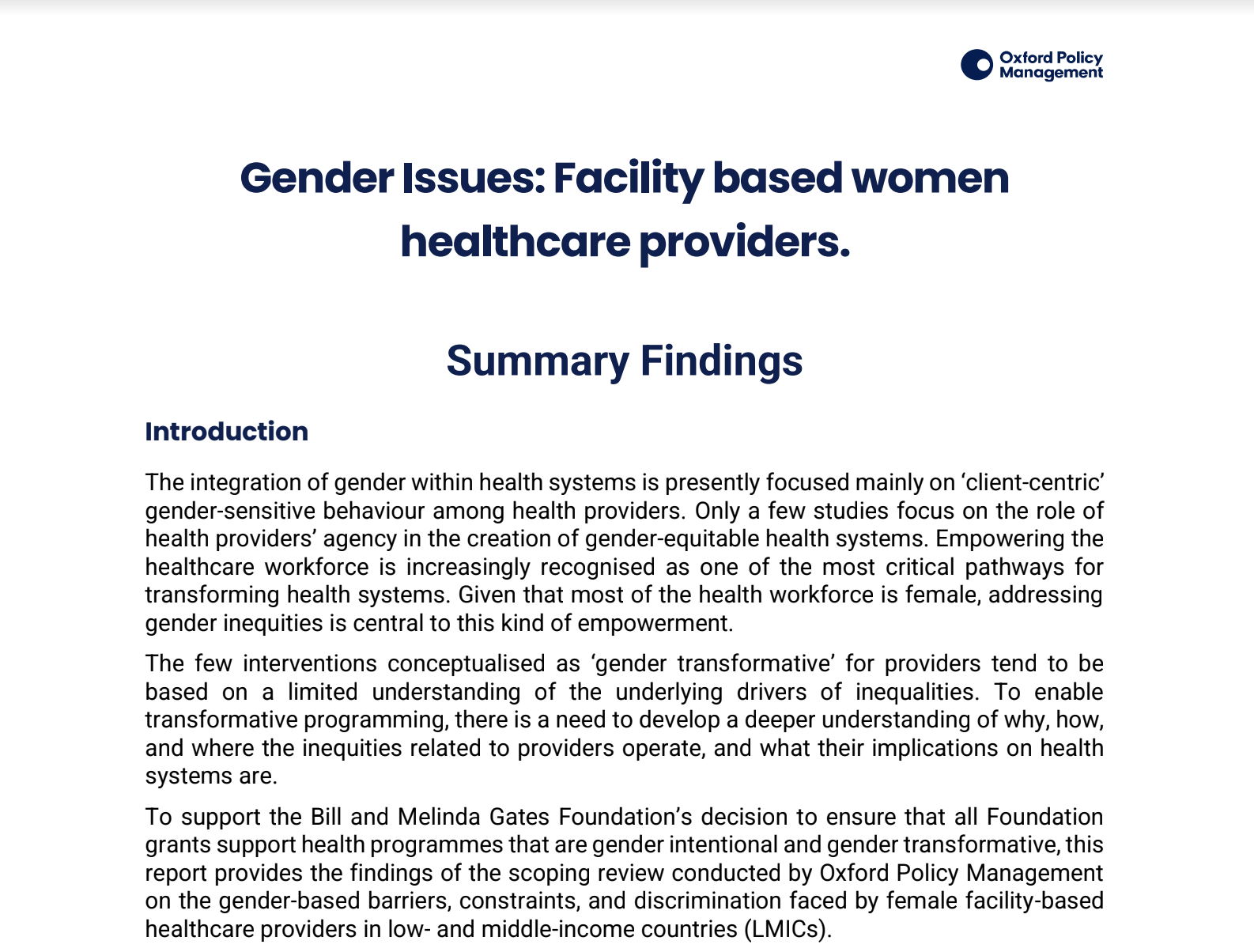Pathways to Gender-Intentional RMNCH: Integrating Gender E-modules in Uttar Pradesh Health Workforce Training Programmes
Quicksand Design Studio

On November 21st, GenderCollab held its second session as part of the GenderCollab Dialogues series, where the Institute for Global Public Health - University of Manitoba (UM) and India Health Action Trust (IHAT) presented how they have integrated Gender E-modules in the Uttar Pradesh Health Workforce Training programmes. The session aimed to showcase various aspects of the Gender E-modules, from their inception to development and implementation in the SBA training programme.
The event featured speakers including Ms Nimisha Goswami (Public Health Specialist, University of Manitoba), and Ms Sivakami Prasanna (Associate- Gender, IHAT), who shared their experiences in developing and implementing Gender E-modules in the training programmes. This was followed by insights and recommendations shared by Dr Dipti Bapat (Consultant, Oxford Policy Management), and, finally, Q&A moderated by Quicksand.
The session
The program draws inspiration from the Institute of Global Public Health (IGPH), the University of Manitoba’s Global Gender Integration Strategy. The mission is to embody a rights-based approach to gender equality in IHAT-UPTSU's health programs, education, and research, contributing to knowledge and evidence on the role of gender in health equity. The initial step was to hold collaborative dialogues with the UP government, National Health Mission (NHM), and state partners to integrate gender into existing programs for sustainability. The next step has been to strategically cultivate an understanding of gender and equity among the different cadres of the health workforce, laying the foundation for gender-intentional health services.
Gender Equity Tool in Health Workforce Training
The integration of gender into health workforce training aligns with the concept of respectful care in facilities and addresses challenges such as compromised privacy, labour room violence and issues of information sharing and consent during service delivery. Skilled Birth Attendants (SBA) training served as an initial entry point for seamlessly integrating gender modules into health workforce training, thereby enhancing the quality of care provided at the facility level.
The 21-day Skilled Birth Attendants (SBA) training, conducted for staff nurses and ANMs posted in the labour rooms at District Hospitals (DH), Community Health Centers (CHC), and Primary Health Centers (PHC), was identified as the initial training platform where a gender e-module can be integrated to enhance the understanding of service providers on gender and equity.
- During the 5th day of the classroom SBA training, the gender e-module is screened and discussed with the participants.
- The SBA cadre consists of last-mile health workers closely connected with pregnant women, mothers, newborns, and families and can be equipped with the knowledge and skills to play a pivotal role in navigating gender-related dynamics between the end-users and the service providers in the labour room effectively.
In the training initiative across 75 districts, the challenge was to seamlessly integrate a gender module accommodating diverse cultural perspectives. The goal was to deliver a clear, consistent message, minimise facilitator bias, and preserve the intended messages' integrity.
Objectives of the E-modules
- Develop knowledge and understanding of 'gender' and equity
- Foster reflection and recognition of the impact of underlying gender norms and relations on service provision
- Improve the acknowledgement among service providers of the impact that gender-sensitive actions can have on care seekers
- Equip the participants to identify actionable pathways to make their facilities gender sensitive for the care seekers.
Developing Gender E-modules
- Formative Research: Collecting personal stories from the field to create films that serve as case studies for reflection and behaviour change. It was critical that the stories were structured to be relatable.
- Identifying Delivery Platforms: Finding innovative platforms for effective communication of gender-related concepts in women's healthcare services.
- Content Development: Aligning the gender e-module content with the overall SBA training, and emphasising the SN and ANM’s role in understanding how gender affects service provision and uptake.
- Implementation of Modules: Identify a ready platform for integration in the case of the SBA gender e-module, it was integrated into the fifth day of the SBA training program.
- Evaluation: Conducting pre- and post-tests in SBA training that include 10 questions assessing the understanding of the gender.
- Scale-up: Designing a comprehensive toolkit that includes pre- and post-training, modules and a facilitation guide.
Components of e-modules
| Module 1 | Module 2 |
| Inculcating an understanding of the concepts of sex and gender through films.Recognising challenges faced by women in the uptake of health services due to gender-based discrimination.Enabling the realisation of the influence of gender norms on the practices of service providers. | Recognising the expression of gender norms in labour room practices.Adapting practices to make the facility free of gender-based discrimination. |
Roll-out Process
The rigorous process of film development involved multiple script iterations before filming commenced. Individuals from different verticals participated in the brainstorming process. Following meticulous editing and screening, the team conducted a comprehensive review with both internal and external stakeholders. Formal approval was subsequently obtained, including approval from the NHM. The rollout, initiated in 2022, included capacity-building training of trainers such as District Nurse Specialists, District Senior Specialists and government facilitators, alongside the integration of a gender e-module into SBA training. The capacity building of TOT is an ongoing process as required.
Current Status and the Way Forward
So far, over 4,000 staff nurses and ANMs have completed orientation on the e-module. Refresher training for 48 saturated facilities* has been completed, and progress is being made in documenting the integration process of the gender e-module. A comprehensive evaluation of the gender e-modules in the 48 saturated facilities is currently underway.
*Saturated facilities are those where all the staff stationed in the labour room have undergone the SBA training with the gender e-module.
The next phase involves the continued rollout of the gender e-modules integrated into SBA training, ensuring ongoing support and review from the engaged facilities in the implementation of gender facility plans through existing platforms such as WhatsApp.
Insights and Recommendations on the E-module
Oxford Policy Management (OPM) shared the findings of a study they did about the implementation of the E-Module in the three study locations in Uttar Pradesh, namely, Lucknow, Meerut and Prayagraj.
Note: As the gender e-modules are integrated into pre-existing training, hence, it becomes important to accommodate the expectations of the government/department in terms of time, activities, etc when developing the module. Thus it is important to keep the context in mind while reading the insights and recommendations.
What worked
- Strategic decisions, such as dedicating specific training days and ensuring adequate infrastructure, have contributed to the success of gender training. The commitment from district hospitals has made the initiative sustainable.
- The visual e-module has helped to capture participants' attention and aid concept retention.
- The familiarity of participants with facilitators led to more interactions during breaks and boosted engagement.
- The module content was effective in sensitising to participants and reflected their daily realities. This led to engaged participation.
- The module was effective in sensitising participants about the role of providers in perpetuating biases. It inspired them to adopt better attitudes, emphasising the importance of male birthing companions and nurses as changemakers.
What can be even better
- Allocating dedicated time for trainers without distractions from other responsibilities, and incorporating regular breaks during the sessions.
- Summarising through facilitation is crucial, allowing for increased participant expression and minimising the passage of wrong information.
- Improving the design of the 2-minute timer screen for discussion.
- Incorporating more interactive activities.
- Addressing any hierarchical relations between the trainer and participants during the training
- Making all scenarios depict the reality of service provision rather than being unrealistic/idealistic.
Recommendations
- Nurses need exposure to content through regular refresher training.
- Additional sessions are required for nurses for whom the gender module is not included in their SBA training.
- Clarity is needed on how to incorporate key takeaways into the 21-day practical training.
- Additional support is needed for trainers— developing facilitation skills, and creating a rotating schedule.
- E-module content can be enhanced by incorporating narratives, such as positive girl-child journeys, the importance of male engagement, guidance on handling family backlash, equal treatment of boy or girl children, removing the depiction of undesirable nurse behaviour, and strategies for managing challenges.
- It would be ideal for facilities to provide essential resources and suitable settings to support the practices emphasised in the e-modules. This includes addressing challenges like the lack of segregated toilets for staff, issues faced by nurses due to the absence of creches and dedicated breastfeeding corners, the need for counselling sessions to help medical professionals manage their pressure and frustration effectively, and limited resources.
- To improve nurses' ability to be gender-sensitive in their work, it is crucial to address significant challenges arising from working conditions and workloads, such as the burden of documentation and staffing shortages.
“When we talk about gender-sensitive and gender-responsive healthcare facilities, it's not just about the end-users. It's also about the staff and how they feel supported by each other and how safe and comfortable they feel in their workspace.”
- Sivakami Prasanna, Associate- Gender, IHAT
Open Discussion
In the e-module, is there a space where staff nurses and ANMs can ask questions and share their concerns?
We've established a WhatsApp group for trained staff nurses from saturated facilities, and that's where some discussions occur. However, it takes time for them to fully open up.
How have senior leaders in the health system responded to these trainings and the awareness created among nurses? Has it enabled nurses to question senior leaders regarding recommended treatments or practices?
Particularly with the SBA training, the MD of NHM has been a significant gender champion. Given the close alignment with the government, collaboration has been excellent. The government has shown keen interest in advancing these conversations, as evidenced by ongoing efforts to extend these modules to more cadres. The team is currently piloting initiatives involving frontline roles like security guards, who aren't traditionally covered in training rosters but play a crucial role in creating gender-sensitive healthcare facilities. The response has been very positive, and the system has been highly receptive.
If you wish to know more about Gender E-modules, see the links below:
Part 1: https://www.youtube.com/watch?v=kuZ2rwzVGyg&t=18s
Part 2: https://www.youtube.com/watch?v=BMFLhSlv79s
About GenderCollab
GenderCollab is a Community of Practice that focuses on facilitating responsive and active learning to drive actionable and impactful change on the ground. It is achieved through research-driven and practice-based gender-intentional processes that can lead to better outcomes for health systems in India.
As part of this initiative, GenderCollab Dialogues provide a space for network members to convene informally, allowing them to discuss, share, and learn from each other regarding their studies, methodologies, findings, and challenges.
Since these sessions are co-created with members, anyone interested in proposing or hosting a session can do so by contacting us at contactus@gendercollab.in.


